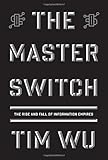This is a fantastic book about how information empires rise and fall — everyone in technology industries should read it. Tim is a professor at Columbia Law School, and one of the most advanced thinkers about a number of technology network effects, but especially Net Neutrality.
It’s a history of various information technology waves, from the telephone to movies to television to the Internet, some analysis of what’s happening in today’s landscape with Google and Apple and others, and some of Wu’s suggestions for how to create more effective public policy in the future. I loved the first part (although I’m a technology history nerd of first order), and found the part about the current landscape interesting but already a bit out of date, and probably not as deep an analysis as I was hoping for. The prescriptions he outlines I thought weren’t quite right. I had a hard time really understanding how to think about the remedies he was suggesting, and how they could really work.
But overall, fantastic book, and has changed the way I think about technology waves.
While I was at Mozilla day-to-day, when I talked about open and closed systems, I would say something like this: new technologies (e.g. the PC, the smart phone, the tablet, etc etc) nearly always start closed and proprietary — it’s easier to create something completely new that’s innovative and disruptive if you control all the pieces, aren’t trying overmuch to play nicely with others. But then over time, technology tends to open up, as the techniques become more widely undertsood, horizontal layers come in to drive costs down and increase variety of solutions, etc. The interesting variable in every technology wave, I said, was how long and messy the “middle” between open and closed is — and of course, Mozilla’s mission with respect to the Web was to make the proprietary phase as short as possible, and get to open as quickly as we could.
After reading Wu’s book, I still think that’s essentially true, but not really the whole story. I now think technology waves tend to go from closed/proprietary to open and then back to closed, based around the strength of network distribution. In other words, and especially with communications and information technology, you tend to go from proprietary invention to open innovation and then things settle down as a small number of players control the distribution of content on their own networks based on the open technologies. These networks then tend to be few in number, and overwhelmingly dominant in their control over how people experience the technology and content.
The only thing that really unseats these networks is the rise of the next technology wave — that’s possible because successive technology waves tend to be much larger than what came before. That’s what’s happening now, with mobile completely overwhelming the previous waves of computing, being available to more people, more of the time, with more touch points in their lives.
And that’s why the fight between Apple, Google and Facebook is so, so fierce. Everyone is trying to move from the current wave of IT into the mobile one. Everyone is trying to become dominant, in order to take the wins from the network effects from the PC/Web battles and use them to win the next Mobile/Networked battle.
[As an aside, it’s tough to imagine what technology wave will displace billions of people carrying smart phones (little network connected computers) around with them all the time, but what we do know is this: it will happen. Some giant new information tech wave will eventually make this mobile technology boom, which looks absolutely massive to us now, look small in retrospect. It’s the nature of communications technology.]
Another thing that’s clear as you look at historical technology waves is that they’re getting shorter. Disruption is coming faster and faster. This, too, is an intuitive result. Each technology wave means that we’re able to communicate and collaborate more effectively and more quickly.
Companies that are dominant in one wave do not tend to be dominant in those following. They can be relevant, and even extremely relevant, but they don’t tend to dominate in the same way. Lots of reasons for that. They’ve got existing businesses to protect. They’re built on previous models of efficiency optimized for previous waves. They get big and complex and tired. I’m beginning to think that companies don’t dominate like this because not only are their innovators dilemma issues inherent in moving from one wave to the next, but also because you’ve got to not just jump waves, but also go through the closed-open-closed cycles of the new technology, and that’s an unnatural set of transitions to go through.
What I find so interesting about our current context — everyone who was dominant in the PC/Web era moving to the mobile era — is that they’re trying to jump directly to the closed network phase. Mobile systems right now look extremely vertically integrated, from services to servers to devices to content. I can’t yet discern the really open phase of mobile. I believe it will come, but it’s hard to see quite how right now, and I think this “open” battle between Apple and Google is really just prelude.
But who knows. It’s an exciting time to be alive and working. Every day I wake up and meet people who are building technologies and products that promise to completely rework the way we interact with our world and with each other. It feels like so much open water here; everything seems up for grabs.
I can’t recommend reading Tim Wu’s book highly enough. Whether you agree or disagree with any particular bit of it isn’t that important. Thinking about the technology waves that have come before help us think about what might come next, and how they might feel.




slide.013-tm.jpg
May 3, 17:56 › Cinsel sohbet odalar?: ?nsanlarla konu?mak çok daha fazla etkile?imli konu May 3, 17:56 › Gabile sohbet odalar?: Gerçekten herhangi bir yanl?? anla??lma veya ileti May 1, 0:45 › ????????????: An intriguing discussion is worth comment. I do believe Apr 5, 21:31 › bizim mekan: thank you very much admin.